Wednesday Feb 25, 2026
Wednesday Feb 25, 2026
Thursday, 11 September 2025 00:40 - - {{hitsCtrl.values.hits}}
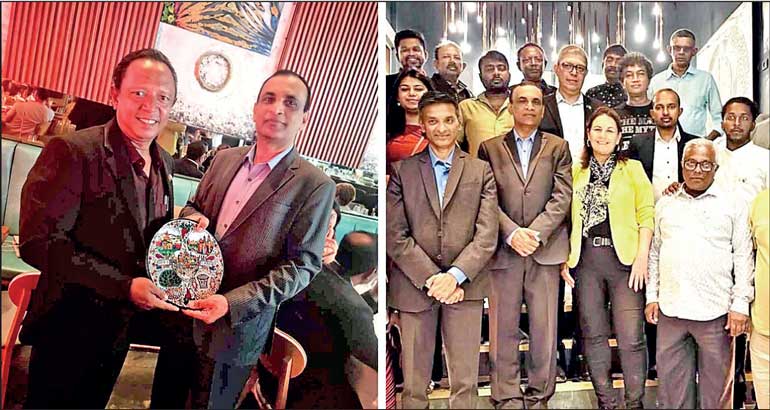
Sri Lankan journalists visiting Israel
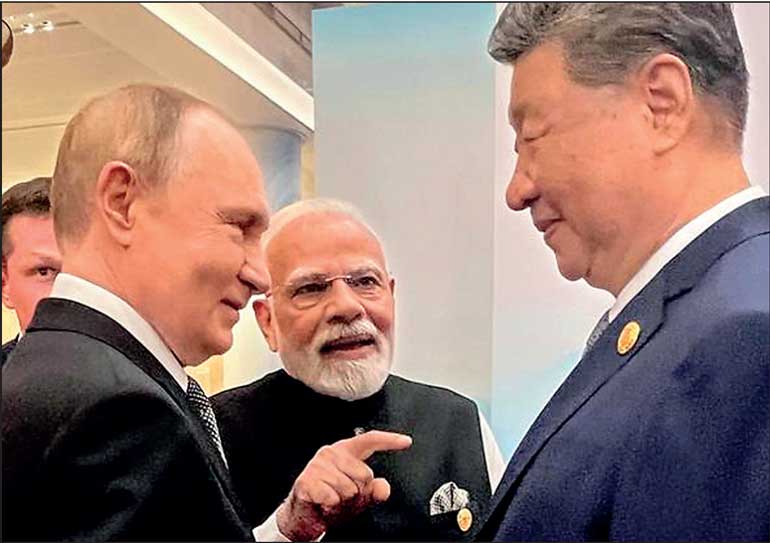
R-I-C: Russia, India, China at SCO 2025

Not Anura’s scene: SCO leaders at 25th anniversary summit
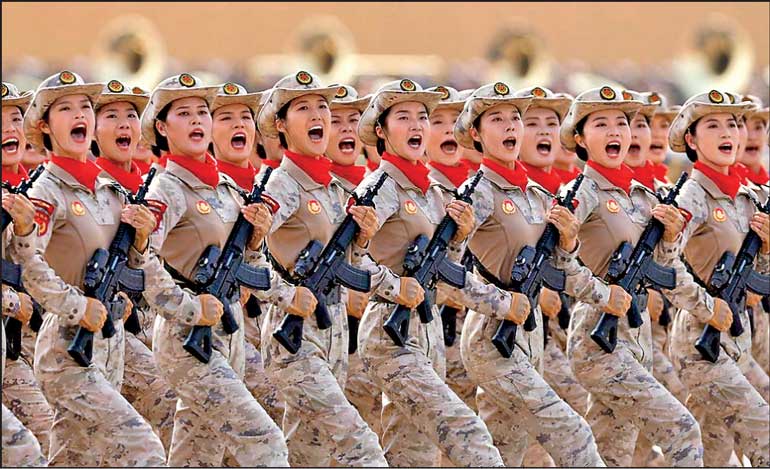
AKD misses China’s 80th anniversary of victory in WWII
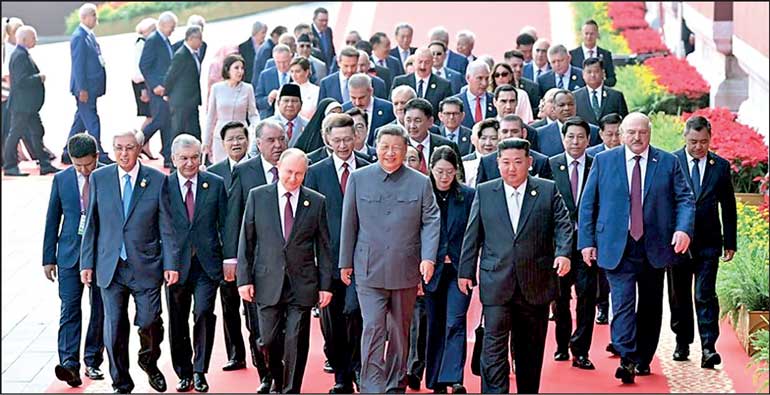
Eurasian leaders arrive at 80th anniversary parade. AKD absent
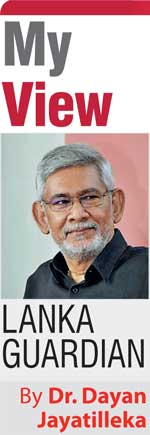 Sri Lankans are trapped in a triangular matrix of three Big Lies:
Sri Lankans are trapped in a triangular matrix of three Big Lies:
(I) ‘The Aragalaya was mainly for system-change’. If true, almost a million people who flooded Colombo on July 9th 2022 morning couldn’t have shrunk to about 15,000 by nightfall after they’d successfully evicted Gotabaya. The numbers never reassembled but returned only to explore and picnic outside occupied/liberated buildings. The Aragalaya was specific and concrete, mainly about limited and legitimate ‘regime-change’, not ‘system-change’: sending Gota home, just as in the Philippines in 1986 it was about deposing Marcos.
(II) ‘We suffer from bankruptcy and economic crisis because of corruption by our successive rulers.’ The truth is that we are in a foreign debt trap, as are a great many countries of the Global South. Since the mid-1980s to 2024 there have been many international conferences (convened by the UN, Fidel Castro, Pope Francis) about the problem-- because it wasn’t/isn’t an issue of corruption by local rulers (still less in local currency). Corruption has been as a result, not the root cause of the debt trap. Combating corruption is good, but of entirely secondary significance and isn’t the structural solution.
(III) ‘The unprecedented spike in lethal shootings is a symptom of political Godfathers panicking about exposure and prosecution’. The truth is that in the USA the mafia was brought down by the FBI, cartels by the DEA; around the world, armed criminal gangs are busted by specialised, experienced Police investigatory units. But in AKD’s Sri Lanka, the CID has been diverted to the task of investigating politicians and (former) officials for non-lethal, non-violent ‘white collar crimes’, recording their statements and petitions about them. Exploiting the opening, there are more criminal shootings daily, including a record of four in one day, after the spectacular capture and return of gangland bosses than there were before.
Eurasia rising, Anura’s avoidance
Every country, especially every small country, needs every bit of space it can get in the international system. Even as Ceylon, Sri Lanka engaged in a strategy of international participation. This enhances our bargaining power and autonomy.
Whoever the leader and whatever the ideological bent, Ceylon/Sri Lanka never forfeited the chance to be represented and participate globally. Sir John Kotelawela blundered in Bandung in 1955, but he was there. Madam Bandaranaike was at the founding on the Nonaligned Conference in Belgrade in 1961. When JR Jayewardene, nicknamed Yankee Dicky won the 1977 General Election and inherited the chairmanship of the Nonaligned Movement, he was under pressure either to absent himself from the Havana summit or take an adversarial stand towards Fidel Castro and Cuba. Instead, he went to Cuba, addressed the conference, complimented Fidel and emerged firm, lifelong friends with him.
I was there when President Maithripala Sirisena attended the 5th Summit Conference on Interaction and Confidence-Building Measures in Asia CICA) in Dushanbe, Tajikistan in June 2019 with Presidents Putin, Xi Jinping, Tayyip Erdogan, Hassan Rouhani et al. At short notice I arranged the bilateral meeting with President Putin.
President Anura Dissanayake chose not to attend the BRICS Plus summit he was personally invited for. Neither the PM nor the Foreign Minister represented him. Now he’s outdone himself by failing to attend the enormously successful 25th Conference of the Shanghai Cooperation Organization (SCO) in Tianjin, China, which was followed by the spectacular military parade in Beijing marking the 80th anniversary of China’s victory in WWII.
The SCO summit, the in-gathering hosted and powered by China in August 2025 marked an inflection point in world affairs. As important as the Bandung summit 70 years ago and potentially even more so, it revealed Eurasia rising.
If Anura Dissanayake, Tilvin Silva and Bimal Rathnayake had (actually) studied Lenin, they’d know that in his very last essay he had identified the decisive importance of the Eurasian core --Russia, India, China-- in determining world history:
“...In the last analysis, the outcome of the struggle will be determined by the fact that Russia, India, China, etc., account for the overwhelming majority of the population of the globe. And during the past few years it is this majority that has been drawn into the struggle for emancipation with extraordinary rapidity, so that in this respect there cannot be the slightest doubt what the final outcome of the world struggle will be...” (VI Lenin, ‘Better Fewer, But Better’, March 1923, Collected Works Vol 33).
Sri Lanka could have been there, part of Eurasia rising, but wasn’t because President Anura Dissanayake chose to be absent.
The event was prominently covered for days by every reputed international TV station and the optics made a dramatic impact on the world scene. The warm interaction between Prime Minister Modi and Presidents Putin and Xi was a particular highlight. Of the 26 leaders who attended the event, only 10 were full members of the SCO. The others were Partners—with Indonesia and Turkey being far-flung examples.
Sri Lanka became an SCO Dialogue Partner in 2009, during the Mahinda Rajapaksa presidency. The SCO, like BRICS, has expanded, but AKD avoided them both, and therefore Sri Lanka missed excellent opportunities for networking at the highest levels.
When questioned by the media, Minister Nalinda Jayatissa said “we could have attended, but as you know…” It was about AKD’s forthcoming busy schedule, obviously too busy for the SCO and meeting the leaders who would be there. Social media shared a classic snort: “how privileged we Sri Lankans are to have Anura, a leader who is busier and works harder than Xi, Putin and Modi!”
When a journalist claimed that a Foreign Ministry source said we hadn’t got an invitation, Dr Nalinda Jayatissa snapped back “you should ask the Foreign Ministry!”. If China hadn’t invited Sri Lanka, the JVP-NPP leadership should wonder why. Knowing diplomacy and the Chinese, I doubt they’d have failed to invite an SCO Partner country when so many were present at Tianjin.
That leaves one other hypothesis: Sri Lanka did receive the invitation, but President Anura Dissanayake decided not to go, and not to send his Prime Minister either.
President Xi’s landmark SCO speech stressed three main points:
 Continued economic and trade globalisation, but the kind of globalisation that is more inclusive and equitable.
Continued economic and trade globalisation, but the kind of globalisation that is more inclusive and equitable.
 Rejection of bullying and unilateralism, and the practice instead of multilateralism and defence of the UN.
Rejection of bullying and unilateralism, and the practice instead of multilateralism and defence of the UN.
 The goal of and journey towards a multipolar world order.
The goal of and journey towards a multipolar world order.
President Xi’s vision of the world articulated in this speech is exceedingly congruent with Sri Lanka’s vital national interests. However, President AKD chose not to be there to endorse or be seen to subscribe to these ideals; be part of this historic project.
Was there any tangible economic benefit that could have been reaped down the road by AKD’s participation?
‘Xi’s plans include an SCO Development Bank that would lend in currencies other than the US dollar…Beijing also pledged 10 billion yuan ($1.4 billion) in loans to an SCO banking consortium.’ (https://www.gzeromedia.com/news/analysis/chinas-plans-for-the-new-world-order)
There is a BRICS bank-- the New Development Bank-- based in Shanghai. Even so, AKD dodged the BRICS summit.
Sri Lanka should never be part of any bloc of states against any other, but we must know which space in the world arena we belong to, and is our extended family. The BRICS Plus and SCO Plus are certainly part of that space. President Dissanayake and the JVP-NPP government have no identification with it.
The AKD administration is regressive (even) in our external relations and foreign policy, in comparison with all its predecessors. Pre-1956 Ceylon signed the Rubber-Rice Pact with China and faced US sanctions (the Hickenlooper amendment). AKD just wouldn’t have had the guts.
Diplomatic deviance: NPP-Israel axis
AKD’s foreign policy pillars are:
 Several secret agreements/MoUs with India.
Several secret agreements/MoUs with India.
 A grotesque relationship with the genocidal state of Israel, which includes visa-free access for its citizens, and visits by personnel of State institutions to the rampaging predatory Zionist state while it wages war with over 80% of casualties being children and women, the highest ever recorded.
A grotesque relationship with the genocidal state of Israel, which includes visa-free access for its citizens, and visits by personnel of State institutions to the rampaging predatory Zionist state while it wages war with over 80% of casualties being children and women, the highest ever recorded.
While Sri Lanka’s President stays away from BRICS and the SCO, the degeneration of Sri Lanka’s external relations under the JVP-NPP Government is best evidenced by the disgraceful role played by the Sri Lankan authorities is allowing personnel from State institutions (Rupavahini, KDU etc.) to be taken to Israel on a study tour while there is an ongoing genocidal destruction of Gaza and enslavement of the West Bank.
Worse still is the open involvement of Sri Lanka’s diplomats, i.e., official representatives of the Sri Lankan state coming under the authority of the Sri Lankan Foreign Minister and senior JVPer Vijitha Herath, in this morally atrocious exercise. The discourse of the Sri Lankan ambassador to Israel is alarmingly enthusiastic. He seems unaware or uncaring that the number of journalists killed by the IDF is the highest in any war in recorded history.
‘A group of 16 Sri Lankan journalists has arrived in Israel on a five-day study program aimed at providing foreign media and policymakers with a clearer understanding of the country’s current situation, Sri Lankan Ambassador to Israel Nimal Bandara said.
Bandara noted that the visit, organised by the Israeli Embassy in New Delhi, would give the delegation opportunities to meet senior officials from the Ministry of Foreign Affairs and the Ministry of Defense. “Our journalists will also observe humanitarian aid operations in the Gaza Strip, which is an important part of understanding Israel’s realities on the ground,” he said.
The Ambassador hosted the delegation at a dinner, which was also attended by Israel’s Consul General in Sri Lanka, Dinesh Rodrigo, Honorary Consul of Sri Lanka in Northern Israel Dr. Annette Bernstein Reich, and Deputy Head of Mission Hemantha Ekanayake. (Newswire)’ (Israel takes Sri Lankan journalists on study tour to educate on current situation - Newswire)
This reflects the relationship that Sri Lanka under the ‘non-elite’, ‘left-populist’ Anura Dissanayaka presidency and the JVP-NPP Government has with a state widely condemned as genocidal, conducting a morally damnable, brutal and barbaric war; a state more evil than the South African apartheid regime that Sri Lanka boycotted.
Sri Lanka of the now fashionably vilified ‘76 years’ and ‘elite rule’ quite rightly banned Bandula Warnapura, Tony Opatha et al from representing our country in cricket because they played apartheid South Africa (for Kerry Packer’s money). That was ‘The Way We Were’.
Strategic/security insanity
Instead of pledging Provincial Council elections, President AKD pledges to withdraw the military from as much land as possible in the North and East. He says the military was in occupation of them because previous governments had been consumed with the mentality of war and preventing the next one—which he guarantees will never take place.
He must ask himself why the ‘forts’ established in America’s Wild West frontier became over time, permanent, massive military complexes (still named ‘Fort’). It is not because successive American presidents or military chiefs thought the Native American tribes would rise up again and attack them. It is because these forts were located at strategically vital points. Similarly, why did the US retain the bases in Germany and Japan, dating from WWII? Did they expect the defeated Nazis or Japanese to resurrect? Again, no—it was because of the strategic value and utility of those locations.
So also, with Sri Lankan military establishments in the North and East. They should be retrenched ONLY after a stringent assessment of strategic and tactical value. In a small island, the tactical is often also the strategic.
President AKD guarantees that there will never be another war in the North-- but how? Wars are not always the product of purely domestic decisions and dynamics, but even if they were, Anura can give guarantees only for the years he will hold office—unless he is immortal.
History reveals that this island has experienced invasions and occupations not because of purely domestic decisions, still less those emanating from the Southern two-thirds, but dynamics and decisions taken outside our shores, be it by neighbouring kingdoms, or contending Western colonial powers oceans away. Sometimes territories are invaded to deny them to a perceived rival.
Why does Anura Dissanayake think that Trincomalee was bombed by the Japanese in WWII, and their repulsion by the RAF, regarded as a decisive moment in that great war?
War could arrive in Sri Lanka’s North and East again in the context of Great Power rivalry between the US and China, or India’s role in it, or due to domestic dynamics within India and aggression on the part of elements in Tamil Nadu who may launch over-the-horizon drone warfare.
Strategists have to plan for all scenarios, and if the worst-case scenario comes true, Sri Lanka will find that President Anura Dissanayake had dismantled the military presence in the North and East.
What AKD seems not to grasp is that our North and East constitutes a vulnerable, potentially porous border, across which there is a landmass of co-ethnics who have a history of hostile incursions including the establishment of kingdoms on our soil. Therefore, there cannot and should not be security insufficiency leading to security vulnerability, still less a security vacuum in the North-Eastern periphery.
President AKD visited Kachchatheevu. Theatrics apart, can he enlighten us how we are going to defend Kachchatheevu from a hostile Tamil Nadu someday, once he has given India a huge footprint in the Trincomalee area? How can we defend either our Northern frontline or even our South, with an Indian wedge in Trincomalee granted by AKD?
Memory war, independent prosecutor
“…A decision has been taken to establish an Independent Public Prosecutor’s Office” announced Foreign Minister Vijitha Herath at the UNHRC Geneva.
The NPP administration is determined to ensure accountability for disappearances in Sri Lanka’s civil wars going back before year 2000. So far, the effort seems to be headed in only one direction. Let me illustrate with just a single example. In October 1987 the LTTE burned alive a Rupavahini crew filming in post-Accord, supposedly peacetime Jaffna. Who is going to ensure accountability for that atrocity and so many others, including sleeping babies hacked to death in ‘border villages’ by LTTE raiding parties?
What is being waged now is a ‘Memory War’, aimed at depicting Sri Lanka’s war of self-defence and territorial reunification as a quasi-genocidal war. The Independent Public Prosecutor’s Office will be the inquisitorial device which legitimises the reign of LTTE terror and delegitimises the war of reunification and the military and democratic leadership which liberated us.
Adikari’s accountability
In his critique of my article on Ranil’s arrest Dr JB Adikari writes: “…But accountability, properly understood…is the lifeblood of democracy”. Later he says “Accountability…is the republic’s backbone”. (https://www.ft.lk/columns/Accountability-is-not-petty-Response-to-Dr-Dayan-Jayatilleka/4-781081)
Wherever Dr Adikari got his definition of ‘accountability as the lifeblood of democracy’ and ‘the republic’s backbone’ from, my modest study of politics leads me to insist that:
 The ‘lifeblood of democracy’ isn’t accountability but representation, i.e., the freedom to choose one’s representatives to lead one’s political community. Lincoln’s definition is immortal: ‘Government of the people, for the people, by the people’.
The ‘lifeblood of democracy’ isn’t accountability but representation, i.e., the freedom to choose one’s representatives to lead one’s political community. Lincoln’s definition is immortal: ‘Government of the people, for the people, by the people’.
 ‘Accountability’ is not ‘the republic’s backbone’. People’s sovereignty is.
‘Accountability’ is not ‘the republic’s backbone’. People’s sovereignty is.